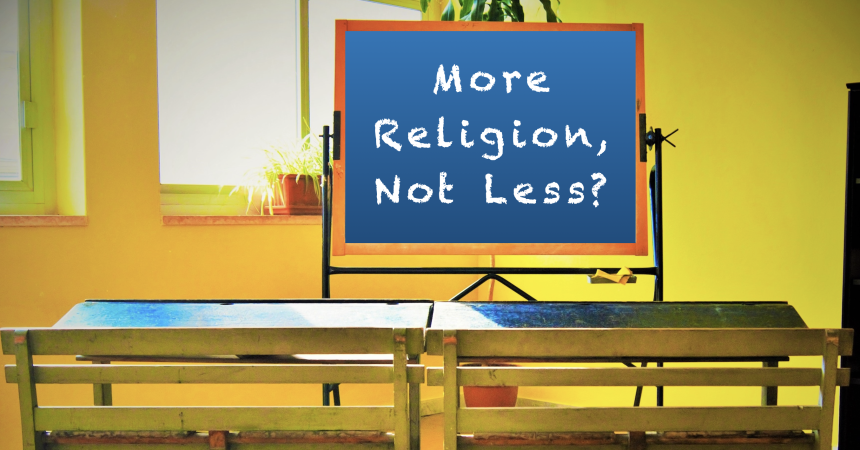
New primary school curriculum framework could mean more religion teaching, not less
Yesterday the Minister for Education, Norma Foley, introduced the New Primary School curriculum framework. You can find the framework here and frequently asked questions here.
This new Framework could mean more time spent on religion in primary schools, not less.
Officially, the new curriculum reduces the time spend on the teaching of religion/Patron’s programme in schools from two and half hours per week to just two hours.
This is now described as ‘Religious/ Ethical/ Multi-Belief and Values Education – the Patron’s programme’. In the ninety percent of schools where the Patron is the local catholic bishop, this means Catholic religious instruction.
But in a worst case scenario, the time spent per week teaching religion could include:
- Two hours per week on the Patron’s programme, which is currently Catholic Religious Instruction in most primary schools.
- An average of between one-and-a-half and two-and-a-quarter hours a week on Social and Environmental Education, which includes teaching about religion and beliefs that is currently included in the Patron’s programme, and which could be delivered in accordance with the religious ethos of the school.
- An average of one-and-a-half hours a week of Flexible time, some or all of which can be used for ‘learning related to a particular aspect of the Patron’s programme’.
Social and Environmental Education
Between six and nine hours every four weeks is devoted to Social and Environmental Education. This translates to between one-and-a half and two-and-a-quarter hours a week.
This teaches about the diversity of peoples: their experiences, cultures, religions, beliefs, and environments in different times. In later years it will be taught as part of history and geography.
The Catholic Education Partnership has described this as ‘the world religions aspect, currently in the patron’s programme, moving into history and geography’. We are engaging with the CEP to see what they understand this to mean in practice.
But on the face of it, it seems that some aspects of what is currently religious teaching will now take place as part of social and environmental education.
Some questions about this new course?
There is no indication whether or not children will be forced to take this course, which will be developed by the National Council for Curriculum and Assessment. But it raises several important questions.
The Department of Education claims that the right to not attend religious instruction is confined to not attending instruction according to the rites on a particular religion, even though they have no legal right to invent this definition of religious instruction.
So will the Department of Education seek to coerce children into this extra form of religious teaching, even if it is against the wishes of their parents?
Will the religious aspects of this course be taught in a accordance with the religious ethos of the school?
And will the religious aspects of this course exceed the half hour per week that is officially being removed from the religion/Patron’s programme course?
Also, will children who take the Patron’s programme for two hours, have to also take the new curriculum course on world religions and ethics?
And is it possible under this new Framework for a school to spend more time on religion per week than before?
Flexible Time
The new Framework also gives what it calls flexible time to schools, ranging from five to seven hours every four weeks, which translates to an average of one-and-a-half hours a week.
One of the things that schools can allocate this flexible time to is “learning related to a particular aspect of the Patron’s programme’. In denominational schools, the Patron’s programme typically means religious instruction.
So, in principle, a denominational schools could have its official Patron’s programme time reduced from two and half hours a week to two hours a week, then make that loss back (or even exceed it) by using some of its flexible time.
No transparency
In addition, schools are not obliged to write in their Admission Policies how much time they will spend on religion per week. Parents will not be able to tell how the religious aspect of Social and Environmental Education is addressed, or how much of the flexible time is devoted to religious aspects of the Patron’s programme.
Parents are again left in the dark in relation to how much time will be spent on religion in schools. Students from religious backgrounds get more teaching time than students who exercise their constitutional right to not attend religious teaching.
Will we ever reach a time in Ireland where a Minister for Education puts the rights of children and their parents first?
Atheist Ireland continues to lobby for a transparent, ethical, secular education system that treats all parents, children, and teachers equally and respects equally their right to freedom of conscience, religion, and belief.








0 Comments
No comments!
There are no comments yet, but you can be first to comment this article.